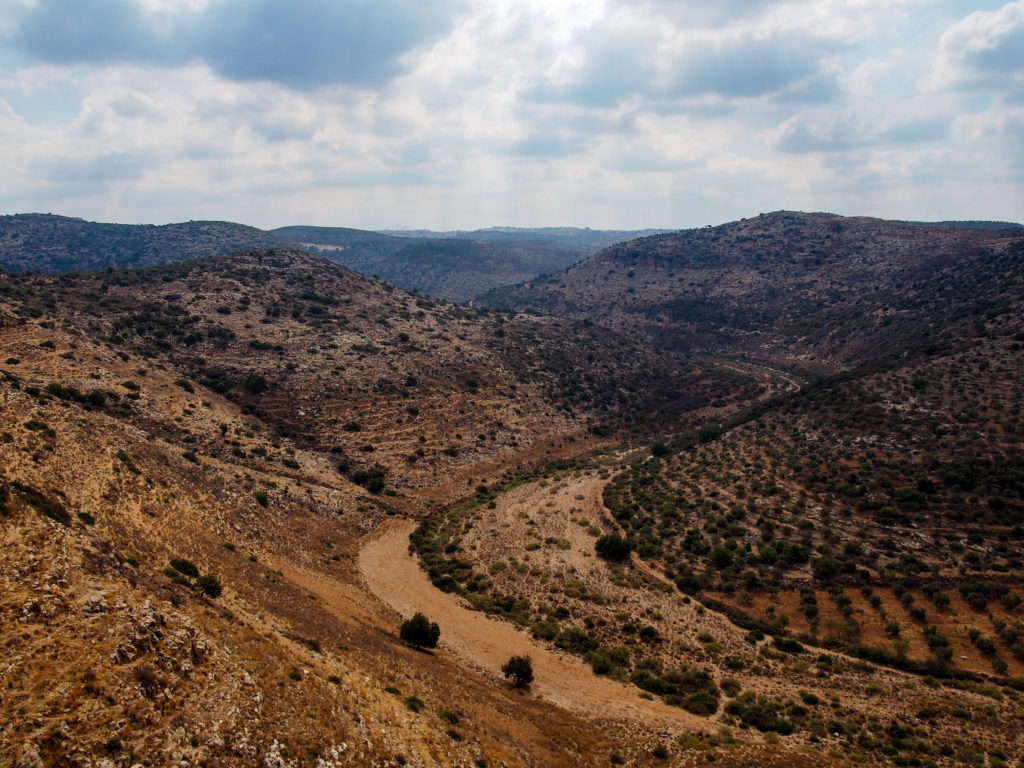
Since coming home from my travels in Palestine, I’ve had many curious friends and family members ask me the same question: what is it actually like there? The media certainly doesn’t provide us with a full image of Palestine, focusing almost exclusively on biased and inherently negative coverage of the conflict. In the west, we receive very little news or documentation of what day-to-day life is like in Palestine, particularly day-to-day life that is relatable and joyful. Understanding that, I share with you today a particularly joyful experience that I had during my travels in Palestine, in which I was privileged to go hiking with a group of Palestinians. I found the experience – both the hike itself and the interactions with my hiking companions throughout the day – to be very beautiful, and perhaps the antithesis of the typical media portrayal of Palestine. So please join me on a walk through the rugged landscape of the West Bank, where along the way we will encounter joy, compassion, and delight in nature.
Hiking in… Palestine!? How I found myself in the West Bank’s Wadi Qana
I roused myself at 7:00 a.m. on my last day in Palestine – on vacation, mind you – because Marwan had invited me hiking. For this night owl, 7:00 a.m. seemed like an ungodly hour, but I sleepily got myself ready and ambled out of my hostel, where I greeted Marwan with a handshake and a hug.
“Ready?” he asked. I stifled a yawn.
“Yep,” I replied before the yawn escaped me. “Yallah.”
I had met Marwan earlier in the week, and his inherent sweetness and easy-going attitude made it easy to become fast friends. We had shared meals, morsels of knafeh, and walks around Ramallah together, and for my last day in Palestine, he had invited me to join his Palestinian hiking group for a day of wandering. I knew that I couldn’t pass up this opportunity and had graciously accepted.
Marwan and I ambled through the quiet streets of Friday-morning Ramallah. The city hadn’t quite woken up yet, with just a few cars, pedestrians, and a single hijabi jogger who darted through the near-empty Al-Manara Square. We went into a little market to stock up on provisions for the day, and then we made our way over to the two buses that would bring us to our hiking destination. This week’s trip would be to Wadi Qana, in the northwest West Bank, not too far from Nablus where I had visited earlier that week. Marwan greeted the organizer, who introduced himself as Tareq, with a handshake before introducing me. “تحكي عربي” Marwan told Tareq. She speaks Arabic. Tareq looked at me with a mixture of surprise and delight, and I just nodded with a sheepish grin. “!شوية” A little bit.
We boarded one of the buses and took off moments later. In total we were a pretty big group: Marwan, myself, and about 40 chipper Palestinians ready to spend the day outdoors. The air was thick with excited chatter in Arabic; nothing like getting out of the city and into nature on the weekend to lift people’s spirits. I settled into my seat, peering out the window as Ramallah melded into suburbs and then into countryside.
Marwan and I sat, chatting, until someone flicked on the radio. Blaring Arabic music circulated through the bus, and around us many of our hiking companions sang along. At one point, the heavy dabka music transitioned into a song that began with a soft series of whistles. Marwan explained, “This is the song that Palestinians listen to when they just want to chill.” I couldn’t blame them! ثلاث دقات made me want to chill out as well. With the melodious whistling and twists of Arabic in the background, I smiled as the West Bank countryside whizzed past me, ready to hike and grateful for the opportunity to do so with this particular group.
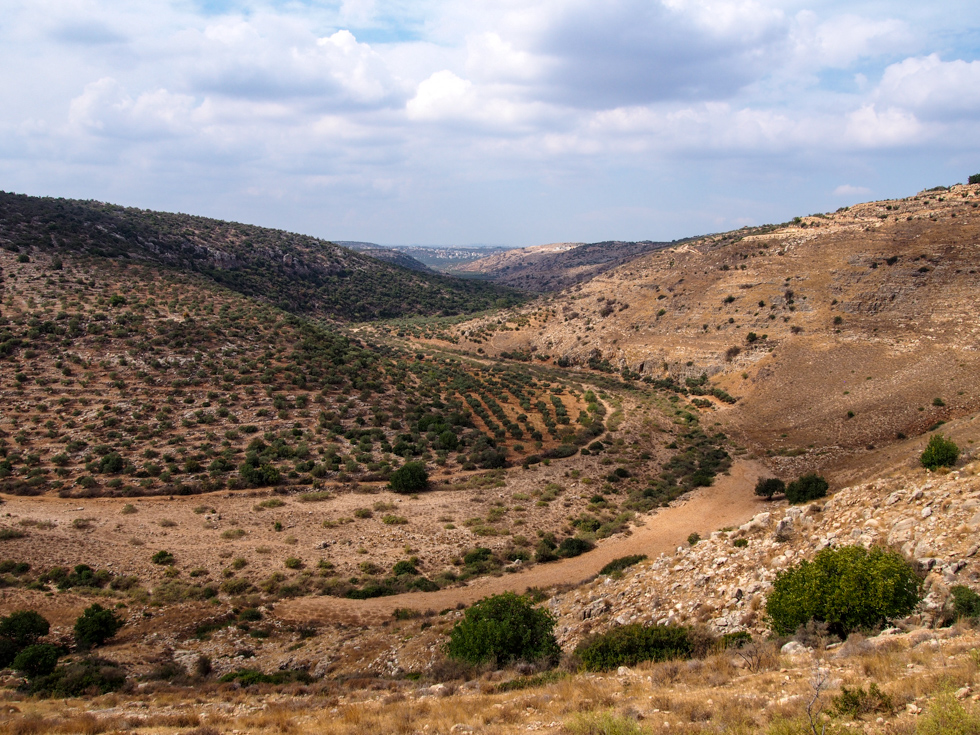
Walking through Wadi Qana
After about a two hour journey, the buses pulled off along the side of the road in a rural area that overlooked an expansive canyon. There were a few houses nearby, where curious children peered out at this group of 40-something hikers, but otherwise nothing but an ample wadi faced us. Tareq directed everyone onwards, and we entered a dusty path that snaked its way down the ravine.
At the top of the wadi, I couldn’t help but feel humbled. There’s nothing like gazing at the beauty of nature from a great view to do that to you. But unlike other hikes, where you start at the bottom and work your way up, we were going in the other direction: starting at the top, and working our way down. And let me tell you: going down can be a trying experience.
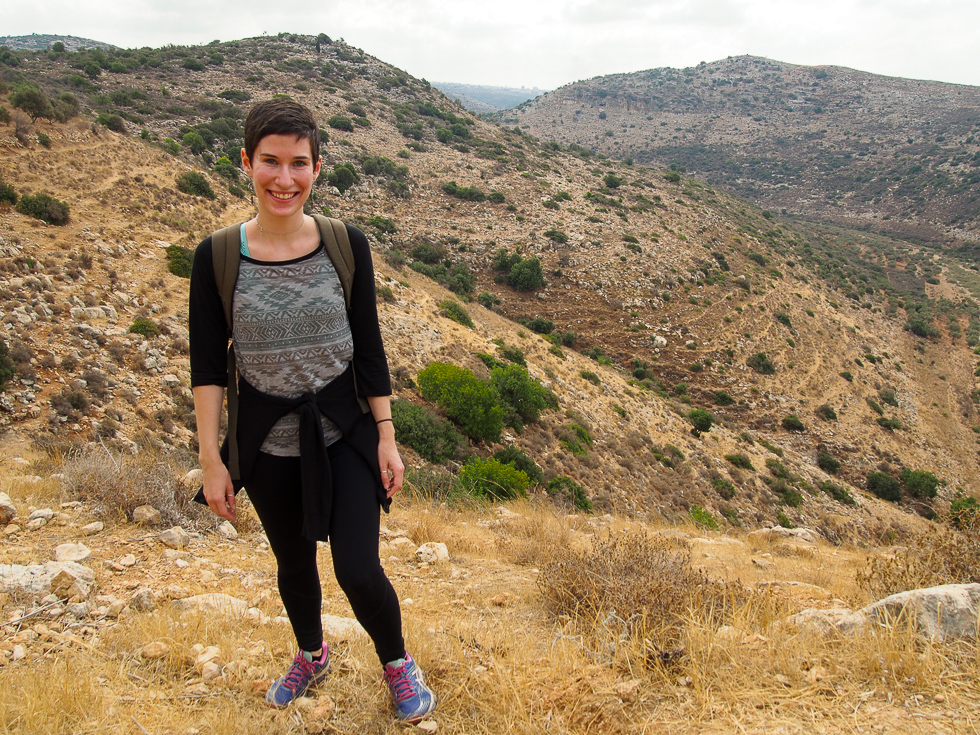
I clung to Marwan as we traversed the steep cliffside, the traction on my old running shoes feeling particularly slick when faced with a near cliff face separating me from the ground. We ambled our way down the hillside, trampling over undergrowth that scratched at our ankles and occasionally sliding our way down particularly steep spots along the trail. In the distance, we heard occasional shouts of “Yallah, yallah!” from our much more efficient (or perhaps just more reckless) hiking companions.
It felt like it took forever to get down to the bottom of the ravine, but we finally made it. I paused to take a deep breath, grateful for the flat ground, and stretched out my shaking legs. Marwan and I were some of the last hikers to make it down, and the group had long settled around a cave at the bottom of the ravine. We could hear bubbles of laughter and joyful chatter in the distance. Marwan gave me a high five. “You did it!”
“Mostly thanks to you,” I winced, glancing at the cliffside. “We don’t have to climb back up this thing, do we?”
“No, we’ll walk through the ravine and the buses will meet us on the other side. But first, we rest. Yallah.”
I followed Marwan through a grove of olive trees, and we emerged on the other side to meet the rest of the group. Some of the guys were boiling coffee in a small kettle in the cave, and the rest were lounging around outside, laughing, talking, and enjoying some brief respite from the sun in the shade of the olive trees.
Marwan and I settled onto a rock outside of the cave, and we wiped the sweat off of our faces as cups of coffee were passed around, photos were taken, and people chatted amicably around us.
One of the hikers, a tall, skinny guy whose perfectly slicked back hair could not be disturbed by the sweat or the trek down the cliffside, sprang to his feet and started to sing. As twists of Arabic poetry rolled off of his tongue, a melancholy song that reverberated off of the nearby rocks in a haunting echo, the crowd around us quieted, listening. He sang for a few moments, body tensing with his inflections, until he held one final, long, sweet note and then stopped with a lascivious smile. This guy knew how to give a good show, and he knew he knew it. We burst into applause.
Meanwhile, with the ringing of music in my ears, I couldn’t help but pause and wonder how exactly I had managed to find myself in this precise place at this precise time. But regardless of how it happened, I was certainly thankful for it.
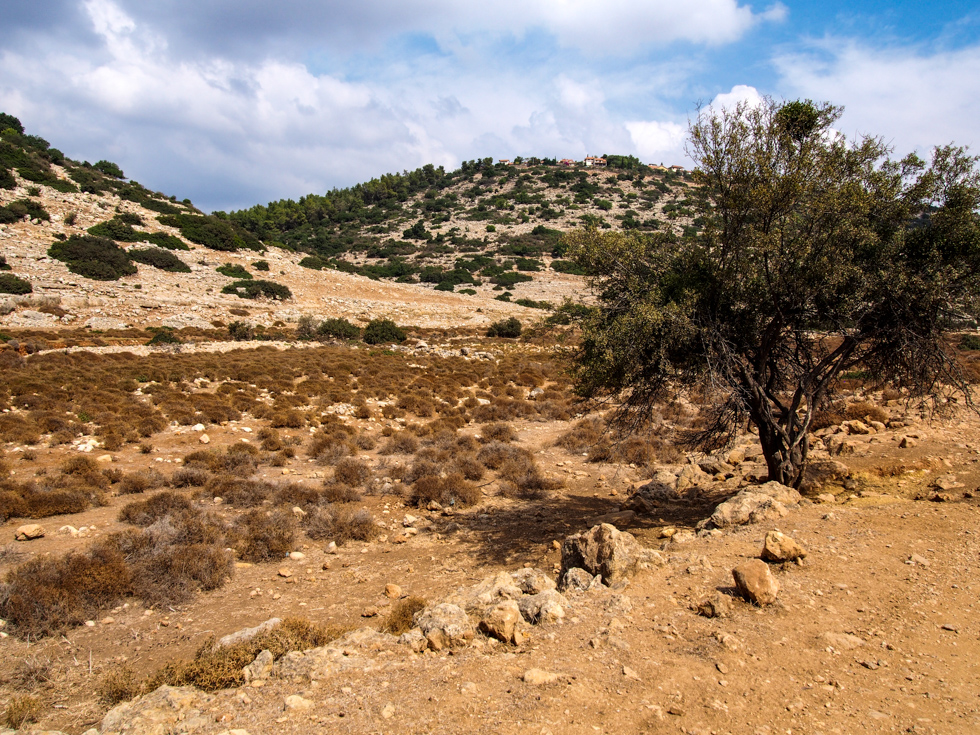
Spatial awareness on the trail
After everyone had rested up and we finished our coffee, Tareq announced that it was time to continue onwards. We gathered up our things and headed away from the cave. There was a dirt road that wound its way through the center of the wadi, and we would be following this road for the rest of our hike. Thankfully, it was flat. Marwan and I followed the rest of the group out onto the path. The clouds had dispersed above us, bathing us in sunlight, with only the occasional tree in sight.
Along the way, I quizzed Marwan on his Arabic vocabulary. He graciously participated.
“How do you say rocks?” I asked, skipping over some rocks.
“صخور” he replied.
“Okay, how do you say clouds?”
“غيوم”
“How do you say ‘I’m happy to be here’?”
Marwan glanced at me with a smug grin. “You know how to say that.”
“!أنا سعيدة لاني أنا هون” I supplied. Okay, close enough. My Arabic was a work in progress.
I wasn’t the only one who got in some language practice during the hike. Being the lone USian among a group of Palestinians, I was a bit of a spectacle. A few of the more extroverted hikers approached me at various points to introduce themselves, practice their English, and find out how the heck I had managed to end up in Palestine’s Wadi Qana. I spoke with Ishaq about his love of theatre, with Abdallah about the weather in New York City, and with the singer – named Adel, I found out – about gay marriage, of all things. The hikers were a social bunch.
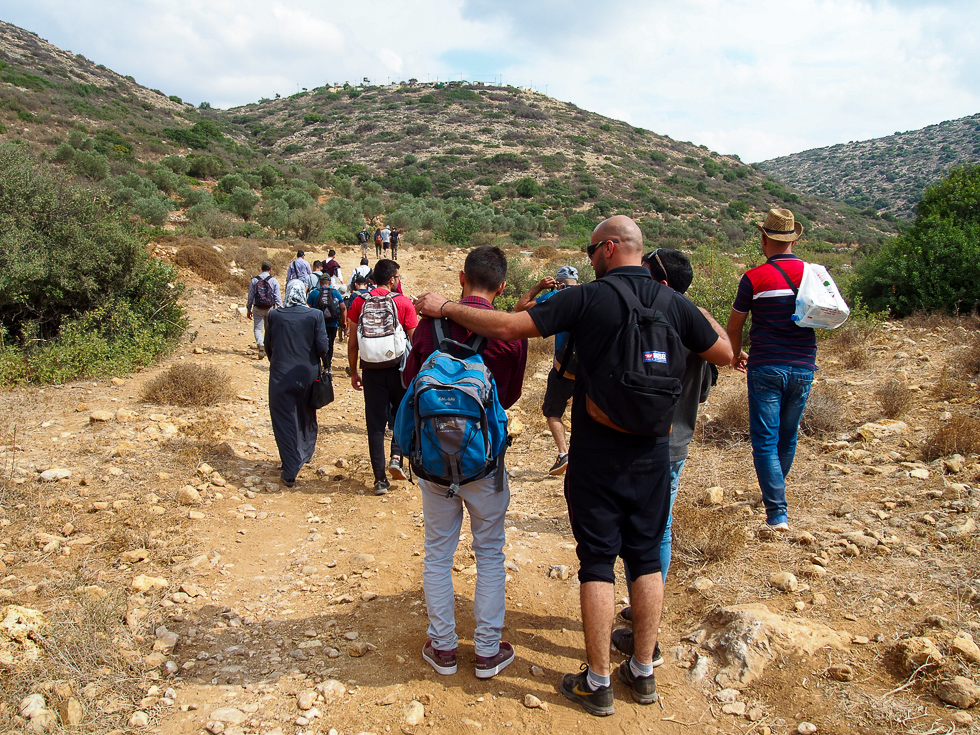
Tareq narrated our journey as we walked, detailing the history of the area and the surrounding land uses, with Marwan kindly translating at my side. Tareq explained how a group of Bedouins lived nearby, pointing to some caves at the top of the hill. Further along the path, he pointed out a local herder wrangling a group of cows, languidly grazing on the ridges of the wadi. And also as we walked, we passed various villages and towns that dusted the hillside. As we passed the clusters of homes, Marwan clarified for me: “That’s a settlement. That’s a Palestinian village. And over there is another settlement.”
It was eye-opening, because we were in what felt like the middle of nowhere, yet we passed multiple Israeli settlements. And we were on foot. Before traveling to the West Bank, I had very little sense of the scale of this land. Altogether, Palestine and Israel encompass an area of land that is about the size of the state of New Jersey. The West Bank itself is only a little bigger than 2,000 square miles (so a little bit smaller than the state of Delaware). Over 100 Israeli settlements exist throughout the West Bank, many of which are entire cities with established homes, services, roads, and infrastructure. The settlements are continuously expanding, in spite of being considered illegal by international humanitarian law. Their presence in the West Bank imposes significant restrictions on the lives of the Palestinians, such as through the designation of Israeli-only roads that impact travel and commutes of Palestinians, the expropriation of the majority of the West Bank’s water resources into the settlements and out of the West Bank, and the continuous seizure of land and resources in an already tiny and resource-deprived area of land, essentially barring the opportunity for a separate Palestinian state.
I gazed out over the passing settlements, arrays of homes and networks of streets under the calm of the blue sky and the afternoon sun. And then we kept walking, and my attention returned to the group before me, yet it was with a nagging sense of the scale of the land I was walking and the challenges along the road to peace.
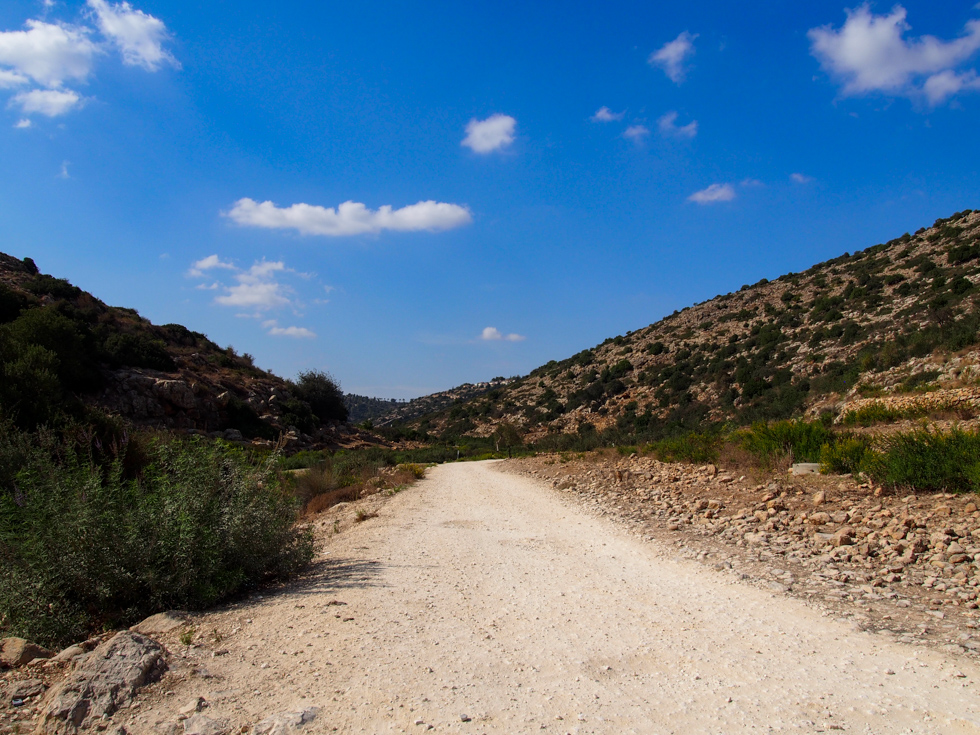
Oasis in the desert: reaching the end of the trail, and why all of this is important
And finally, we arrived. The path eventually led us to an oasis of greenspace, replete with grass to lay down in, a grove of lemon trees, and a nearby creek. Marwan and I went and joined a group of the hikers who had started to settle down in the shade of some trees. Everyone took out their provisions and spread them out in the middle, a feast of hummus, pita, olives, juice, meat, crackers, fruit, and more. Marwan and I added our rations to the pot as we introduced ourselves to the group. And then we just settled in – the hard part was over. Now it was time to eat, drink, relax, and make friends.
At one point, Tareq came over to our group and said something. I listened intently, trying to catch it, but only bits and pieces filtered into my brain. خمصطعش. Fifteen. But fifteen what?
Marwan translated: “We walked 15 kilometers.”
“What?” I couldn’t help but question, looking quizzically at Marwan. He nodded, but I was still in disbelief. “That’s a lot! That did not feel like 15 kilometers.” Other, shorter hikes that I had done had felt way longer and way more taxing than that day’s hike.
Marwan grinned. “It’s true!”
“Oh, come on. He’s lying,” I joked. “How do you say ‘liar’ in Arabic again?”
“Shh!” Marwan looked around covertly and lowered his voice. “You can’t call him that. It’s really bad. Joking around with friends is one thing, but you can’t joke with someone you don’t know like that.”
Oh! Well that was certainly good to know. I thanked Marwan for helping me avoid a cultural transgression, and instead mulled over the 15 (supposed!) kilometers that we had walked. It had been so peaceful, so joyful.
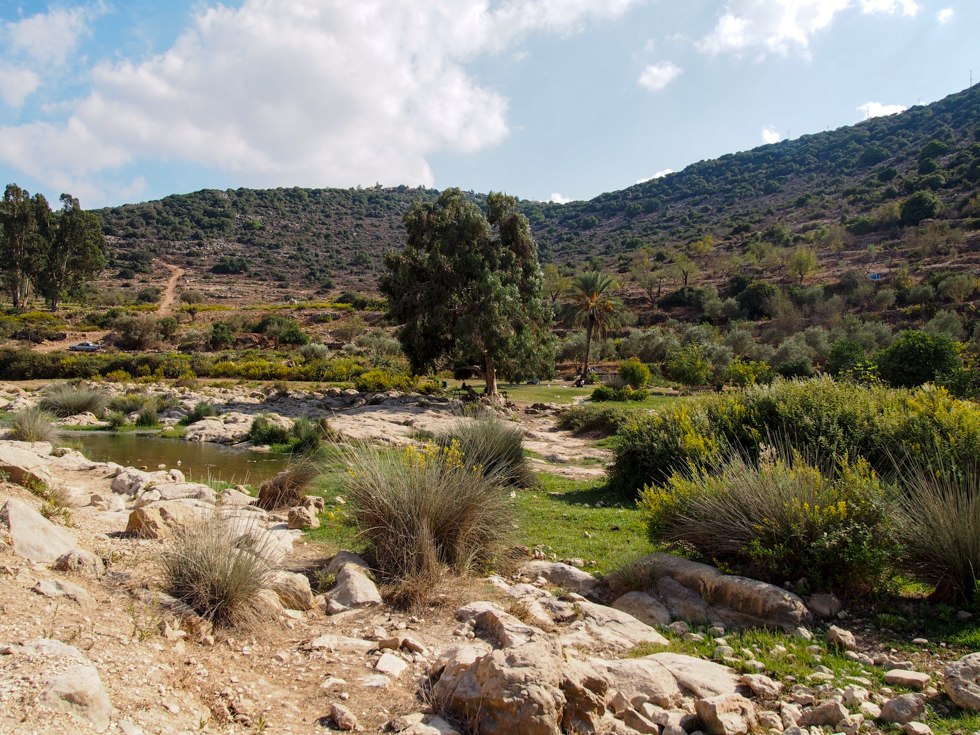
Around us, the conversation was easy-going. I mustered my way through some conversations in Arabic, but for the most part I let words that I didn’t quite understand just wash over me. Marwan was happy to translate, but I was comfortable in not always knowing. I was happy to just relax among the people around me, listening to the throaty inflections of a beautiful language, while appreciating the experience that I had been invited to partake in.
And I had to share that experience here, not because hiking in Palestine is a “must-do” thing or even so much because it was a powerful experience for me, but for two other, important reasons.
One. Hiking is a pleasant pastime for many, but I believe that in the West Bank it serves as a particular type of therapy, particularly for Palestinians who live under the constant stress of occupation. Hiking provides a chance to get outside and walk for hours, seemingly unrestricted, in a land that is characterized by restriction: during the hike there are no checkpoints and no soldiers, and Palestinian hikers are able to simply move. I believe that there is something liberating for nature-minded Palestinians in being able to go hiking, and as an outsider I feel grateful to have been able to wander alongside them.
And two. In a time when all we hear about Palestine in western media is violence and conflict, it can be hard to imagine “normal life” in the West Bank. But like elsewhere in the world, Palestine is a place with bustling cities, tranquil countryside, and a rich variety of people with vastly different hopes, fears, ideologies, and ambitions. Palestinians, like you and I, go to school and work, eat dinner with their families, fall in love, dance and sing, experience heartbreak, laugh with friends, feel loss, and experience joy. And some Palestinians, perhaps like you and I, love hiking: the feeling of being surrounded by nature, of feeling sun and sweat on skin, of legs trembling after a long day’s walk, of the satisfaction of the body working hard and the appreciation of the natural world.
During my walk with the Palestinian hiking group, I witnessed laughter, debate, sharing, camaraderie, and compassion. And I hope that this image of hiking in Palestine serves as one more narrative of what Palestine is actually like, beyond the conflict. Many people have negative conceptions and assumptions about Palestine, about its people, culture, and day-to-day life, and to counter that, I share what I encountered while traveling in Palestine: the simplicity of a day of hiking, in which a group of Palestinians shared a walk, a meal, and the joy of being in nature.
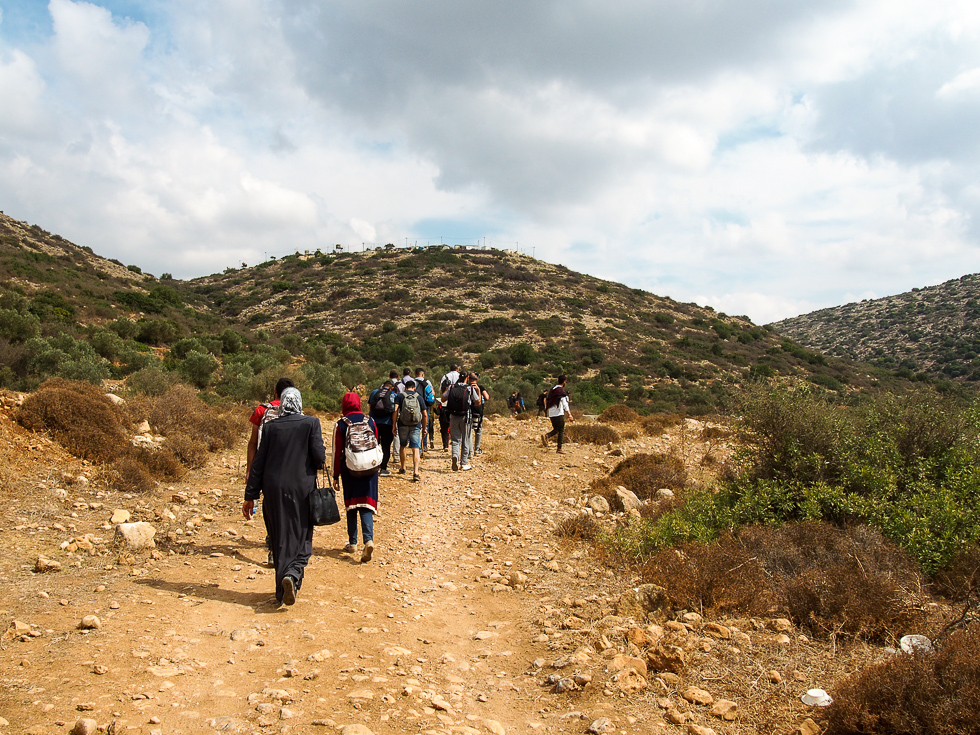
Practical tips for hiking in Palestine
I was incredibly fortunate to have had the chance to go hiking in Palestine, and am especially grateful to Marwan for inviting me along with him on this experience. Unfortunately, I’m no expert on where to hike in the West Bank, but I can personally recommend Wadi Qana as a lovely destination. Otherwise, Jericho is a known destination for hiking in Palestine, with a number of trails and many sites of religious significance in the area. The Wadi Qelt hike is particularly famous. Hiking in the West Bank is perfectly safe, but as in anywhere in the world, I would not recommend hiking alone. Bring a friend (preferably Palestinian who knows the area), hike during the daytime, and enjoy the shared experience of beautiful sites and companionship along the trail.
Also, keep in mind that there are checkpoints throughout the West Bank, including “pop up” checkpoints, so make sure to bring your passport with you, even for a day hike. Also, Palestine is located in an arid zone – make sure to apply sunscreen and carry lots of water with you. Also note that these hikes are in rural areas without visitor’s centers or other facilities, so plan your bathroom needs accordingly.
Based on my experience hiking down the ravine in Wadi Qana, I would recommend hiking boots with significant traction. My running shoes weren’t quite cutting it! Also, note that the land is very dusty – your shoes will end up caked with lots of dirt after a hike in Palestine.
Finally, remember to pick up all trash that you generate (including any toilet paper!) and take it with you to be disposed of at a trailhead or when you are back in one of the cities. It’s important to leave no trace while traveling, and picking up after ourselves is an easy way to leave these places looking beautiful for others to enjoy as well. This is an example of being a responsible and environmentally conscious traveler.
Finally, enjoy! Hiking in the West Bank is a fabulous experience, and I hope you have as positive of an experience during your hike as I had during mine.
Note: some names have been changed.
Do you enjoy hiking during your travels? Do you prefer day hikes or longer, multi-day hikes? What’s the best hike that you’ve been on? Would you try hiking in Palestine? Let me know in the comments below!
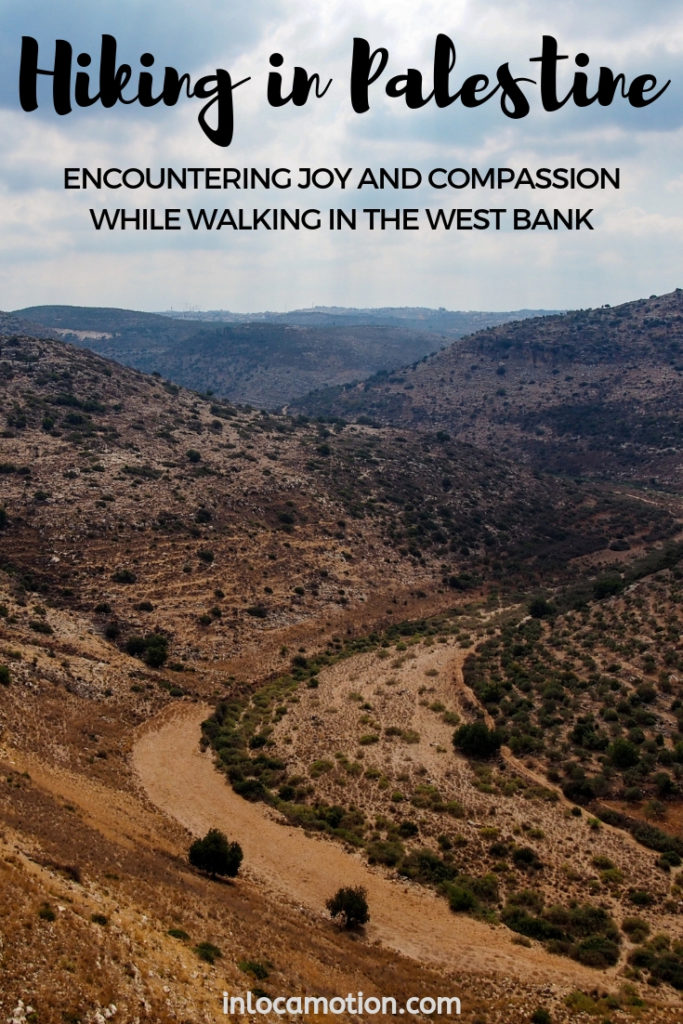









14 comments
What a fantastic post! I love your story telling. And though I haven’t been to Palestine, it brought up memories of a recent trip to Jordan and hiking down into a Wadi and the incredible people you meet and how you can do a long hike that seems like nothing. Thank you for sharing!
Thank you so much, April! I’m so glad that you enjoyed the post, and that it conjured up fond memories of your trip to Jordan. I highly recommend a visit to Palestine if you’re ever back in the region! Thanks for reading and commenting 🙂
I love those moments when you are traveling and think to yourself, how did I get here!? It’s refreshing to read a different perspective to Palestine than we always hear in the news. I think stories like this are so important to share! It is so cool that you got to share the hike with locals. By the way I find hiking downhill much harder than going up! I do enjoy day hikes though.
I’m so glad that you liked the post 🙂 And I agree with your thoughts on going down vs going up, and day hikes! Thank you so much for reading and commenting, Elizabeth!
Thank you for your perspective and insights into not only hiking in Palestine but also what we don’t see in the media. And, hiking is like a sport. I learned that when I hiked in Nepal. Great post!!
Thank you for your comment and support! And totally, hiking is definitely a sport! But one that leaves you with a very distinct feeling of satisfaction by the end – something about being in nature, I think. Thanks for reading and commenting, Adriana 🙂
Great to read. Hiking through Palestine is now on my list of things that I want to do when I get there. Your post is a wonderful expression of how traveling can connect people through shared experiences. It’s a way of making our world larger and smaller at the same time.
Thank you so much, Sue! I hope that you have an amazing time in Palestine!
I’d love to visit, it looks so beautiful!
It definitely is! 🙂
Wow, what an experience. Thank you for sharing. It’s true that not a lot of people venture into Palestine and it’s lovely to see how peaceful your experience was. I appreciate a local guide more than anything and Marwan seems to have been incredible. It’s great that he was able to help you navigate the culture, like the joking (totally something I would have done too).
I’m so glad that you enjoyed the post! And yes, partaking in this experience with a friend made it particularly special, and was so helpful in terms of navigating the culture. Thank you for reading and commenting, Natasha 🙂
Hey Alissa,
Simply excellent post. This is so much informative & I have enjoyed till end of the post.
Thank you, I’m so glad that you enjoyed it!!